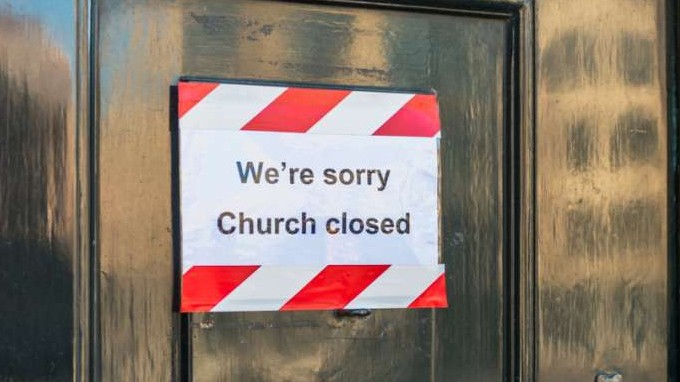The View
Last week the Irish Catholic Bishops’ Conference published a message to the Faithful entitled ‘Do not lose heart’. A day later it was reported that the four Catholic archbishops of Ireland had requested a meeting with the Taoiseach to address the current restrictions that prevent the celebration of public masses.
The news gave hope to Catholics all around the country. For many, this was the reassurance that was sorely needed that someone was going to fight their corner against a State that has banned public worship.
The archbishops stated that public Masses are “at the very heart of what it means to be a Christian community”, that the Mass is a “profound expression of who we are as a Church” and that the loss of the spiritual support has had a detrimental effect on the mental health of many parishioners.
There is also the serious loss of financial support to parishes around the country while public Masses are banned, which may well speed up the closure of churches that were already struggling.
While these concerns are undoubtedly valid and true, there is a better and more important reason why the current ban on public Masses should be reversed, and it is expressed in Article 44.1 of our Constitution: “The State acknowledges that the homage of public worship is due to Almighty God.” This is of primary importance in any human society.
Commandments
We are reminded by Christ himself of the two great commandments: “You shall love the Lord your God with all your heart, and with all your soul, and with all your mind, and with all your strength. You shall love your neighbour as yourself.” The whole law is summed up in those two commands, and the first unequivocally requires the worship of God.
Only a society that has rejected God could regard this as non-essential.
Although ours is such a society, our rights as religious believers are (for now) protected under our Constitution. After all, the separation of Church and State means that the State may not force particular religious adherence, nor ban any particular religious adherence. The right to openly practice one’s religious beliefs is a cornerstone of western democracy. To put it another way, any state that would ban the religious practices of its people bears the onus to prove why this is necessary, or else runs the risk of being regarded as a tyrannical regime.
Free profession
Article 44.2.2 of the Constitution states that the free profession and practice of religion are guaranteed to every citizen, “subject to public order and morality”. It seems to me that in the absence of credible evidence that public Masses pose a serious threat to the health of the people, the Government doesn’t have a leg to stand on.
They would have to give a good reason why they were unjustly discriminating against religious people worshipping God, while hairdressers and beauticians remain open and staff and customers are in prolonged, close physical contact.
Also open are schools, where social distancing is a box-ticking exercise that is set at nought as soon as the children run out into the playground.
Department stores are allowing shoppers in their hundreds to enter. I was in Dundrum Shopping Centre last week, where thousands milled around the same mechanically-ventilated building. Compare these scenarios (which I argue should remain open) to the practice in churches before Mass was banned: groups of 50 people, socially distanced, wearing masks and in huge church buildings so sterile with frenzied cleaning that one could perform surgery there.
Just what exactly is the basis for the Government’s unjust discrimination? Why are Irish Catholics the only people in Europe who are banned from going to Mass?
The Government must also justify not allowing “freedom of choice” to religious believers, while many government politicians support the freedom of people to kill themselves and have others assist them to do so.
The recent bill to allow euthanasia went through to the next stage of the legislative process with relative ease. It met little resistance from several senior government members: the belief seems to be that people should be allowed to choose when and how they die, so long as they do not choose to risk catching Covid-19.
These are difficult issues for the Government to overcome. When the pandemic first descended upon us, no one could criticise the State or Church authorities for taking a conservative approach in their Covid-19 response. We did not know what we were dealing with. But time has passed and we now have a better picture of the societal effects of this coronavirus, its transmission and indeed how it affects different age groups and health profiles.
The longer that this ban endures, the more detrimental the effect on religious practice in this country will be”
Relying on a statement that they have the interests of the common good to protect, or the elderly and frail to protect, will be a difficult case for the Government to make in view of their appalling treatment of nursing home patients in the early phase of the pandemic. In any case, there is an answer to this issue: let those who are vulnerable or nervous of catching the virus protect themselves at home, if necessary with support from State services to do so.
They would have protections similar to a Level 5 lockdown, while reducing the devastating effects of lockdowns, or quasi-lockdowns, on others.
It seems to me that while public education and public trade are sanctioned but public worship is banned, the State is falling foul of its constitutional duty not to impose any disability or make any discrimination against citizens on the ground of religious profession, belief or status.
For those of us who are prevented from performing our most basic and essential duty as Catholics – assisting at Mass – our hope now lies in the approach that will be taken by our spiritual leaders towards the State’s unjust discrimination against religious people.
The archbishops will also be aware that the longer that this ban endures, the more detrimental the effect on religious practice in this country will be, particularly for little children who need to be formed in the habit of going to Mass, of becoming familiar with the sacraments, of feeling that they are part of a wider Christian community.
For as long as these men – together with the other bishops in the country – defend and protect our rights, I for one will not lose heart.


 Maria Steen
Maria Steen
